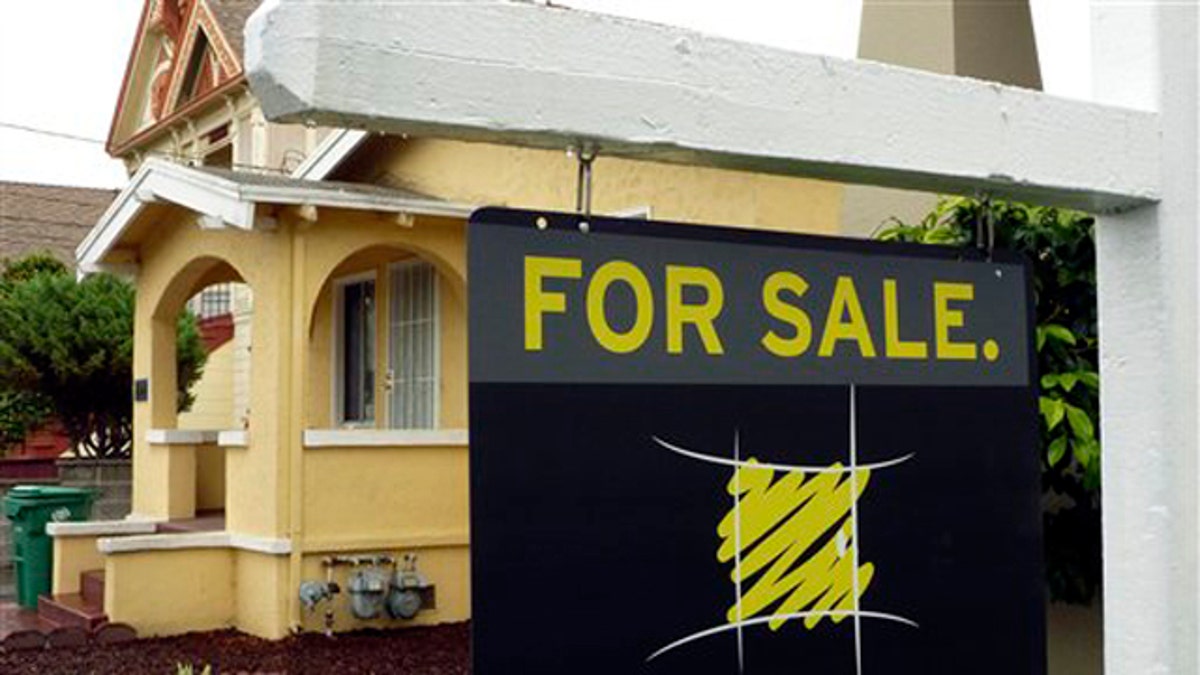Falling Home Prices Erode Nest Eggs, Local Government Budgets
{{#rendered}} {{/rendered}}
A home is seen for sale May 31 in Alameda, Calif. (AP)
Startling new reports show the U.S. housing market is taking a turn for the worse, putting added pressure on families saving for retirement and on local governments that rely on property tax revenue to stay afloat.
The trend is sure to squeeze local communities already faced with the prospect of declining federal aid, as they struggle to pay for basics ranging from schools to roads to public safety.
The latest bad news came Tuesday from the Standard & Poor's/Case-Shiller 20-city index. The round-up of home prices in large metropolitan areas showed prices in a dozen regions hit their lowest level in March since the housing market collapsed in 2006.
{{#rendered}} {{/rendered}}Nationally, prices fell by more than 4 percent in the first quarter of 2011 and have roughly returned to 2002 levels. David Blitzer, chairman of the Index Committee, claimed the numbers confirmed a "double-dip in home prices" in many U.S. markets.
"Home prices continue on their downward spiral with no relief in sight," Blitzer said.
The economic developments pose a political challenge for President Obama, who faces a raft of Republican challengers entering the 2012 White House race armed with claims that his administration has not done enough to improve the economy. Ahead of a new monthly unemployment report, an industry board reported Tuesday that consumer confidence also dipped in May. The S&P report followed one by the National Association of Realtors that showed the number of new home contracts falling in April.
{{#rendered}} {{/rendered}}White House Press Secretary Jay Carney said the administration is "working aggressively" to help homeowners avoid foreclosure and lift the housing market.
Though the administration has faced criticism over a mortgage modification program that has fallen short of the president's predictions, Carney defended the administration's efforts -- noting 600,000 homeowners have extracted "permanent" changes to their mortgages under the system.
"The domestic housing market was hit very hard. ... And it remains a challenge that we're addressing," Carney said, adding: "More work needs to be done."
{{#rendered}} {{/rendered}}The political complications for Obama are outweighed, though, by the economic complications for families and local governments -- both of which view property as a nest egg. For homeowners, their property value is a factor in retirement planning, and the movement in the market has already changed the way Americans think about their retirement. A Gallup poll released last year showed just 20 percent of non-retired Americans viewed their home equity as a major source of retirement income -- compared with 30 percent in 2007.
For local governments, those home values feed a significant portion of annual tax revenue.
And only recently have those revenues started to decline. Though the housing bubble burst in 2006, assessments didn't start to catch up until last year, when local governments first logged a decline in property tax revenue.
{{#rendered}} {{/rendered}}With assessments going down, some governments have responded by raising tax rates.
According to the National Association of Counties, 15 percent of counties raised rates last year; according to the National League of Cities, 23 percent of cities did the same.
In an anti-tax climate, many jurisdictions instead favored cuts to personnel and capital projects to balance their budgets in 2010. But the League of Cities warned in a report last fall that "the full weight of the decline in housing values has yet to hit the budgets of many cities."
{{#rendered}} {{/rendered}}Maureen Maitland, vice president for index services at S&P, said the falling values will make it "very hard" for local governments to expect higher revenue based on assessments.
"They're going to either have to cut costs somewhere else or raise revenues," she said. "That's going to be a big challenge for a lot of localities."
She said forecasters thought the market bottomed out last year, but chalked the optimism up to a temporary boost caused by tax incentives.
{{#rendered}} {{/rendered}}"We haven't quite hit that bottom yet," Maitland told FoxNews.com.
Walter Molony, spokesman with the National Association of Realtors, acknowledged that some governments are looking at raising rates to make up the difference in their budgets. But he advised against "unnecessary tax burdens on homeowners."
Molony also took issue with Blitzer's bleak characterization of the market. He said foreclosures and short sales are creating a "downward skew" in prices nationally, but predicted the number of foreclosures would start to decline next year, gradually balancing out the rest of the market. He urged lenders to loosen up credit requirements to ease the recovery along.
{{#rendered}} {{/rendered}}"We're into a broad trough. It's a very slow recovery," Molony said.
Amid reports confirming how slow that recovery truly is, Obama has tried to lift spirits by touting Chrysler's repayment of its U.S. auto bailout money -- the Detroit automaker said last week it paid back $5.9 billion to the U.S. government.
The president plans to travel to a Chrysler plant in Toledo Friday. Vice President Biden said in a radio address over the weekend that "because of what we did, the auto industry is rising again."
{{#rendered}} {{/rendered}}"Manufacturing is coming back. And our economy is recovering and it's gaining traction," Biden said.
Republicans who believe otherwise unveiled a new plan last week in the House of Representatives aimed at spurring job growth.
